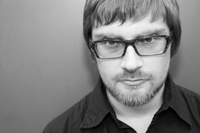Back to the future
Organising a festival embraced by both arts lovers and tech junkies is no mean feat, but academic, artist and certified digital whizz Drew Hemment talks to Nosheen Iqbal about doing just that.

“Anyone who would run a cultural festival [today] as just another cultural festival either needs a very wealthy patron, or is insane.” Bold (if not downright brave) words from Drew Hemment, the founder and director of FutureEverything who is, yes, working on the rebranded launch of his annual festival in Manchester this month. Having spent 14 years better known as Futuresonic, FutureEverything is Hemment’s answer to staging a culture event with a difference. Namely because, as he puts it, “we’re not just [about] art, music and ideas … [but] a social and technology organisation that runs year-round innovation labs, engages in international networks, local advocacy and thought leadership”.
Toss the buzzwords aside and you’re left with a pretty fluid 21st century operation that values cutting-edge technology as much as it does culture that can affect social change. And this is culture in the broadest sense: think digitally savvy, trendsetting stuff. Not isolated bubbles of computer boffinery or beautiful art without social depth, but explorations and experiments with grand-scale ambitions “to bring the future into the present” and “empower people, give them tools to change the way they live”. So far, so optimistic. But can Hemment pull it off?
FESTIVAL FRENZY
The festival market has definitely reached saturation point in Britain: the overkill of events vying for audiences’ attention has swollen triple-fold in the last 20 years according to the most conservative industry estimates. The growth is unsustainable at every level. But by broadening FutureEverything’s aims in a relatively organic fashion (in other words, staying continually apace of the growth, reach and potential of the project), Hemment has shown obvious nous. “We’ve survived through pure belligerence and doing things the difficult way,” he says, keen to emphasise that this also requires “being quite entrepreneurial and finding new ways to be inventive.” Easier said than done, surely?
The success of FutureEverything, explains the ex-electronic music DJ turned PhD student, “lapsed theorist” and artist, lies in the fact that it “marries technology, art, politics and philosophy”. At its core, the festival will host roughly 300 artists spanning a major exhibition, an awards presentation, “living labs”, music gigs, talks and showcases across the city. Last year saw 75,000 people attend the event, which prides itself on giving thinkers, hackers, creatives and many more, the space to collaborate and soundboard new ideas.
“There is an element of an intervention,” admits Hemment. “It’s not passive, I’m not apologetic about that – I don’t believe in a position of neutrality.” In some ways, this enthusiastically boyish 40-year-old polymath provides a shot in the arm for anyone complacent about the jarring fault lines between artistic endeavour and technological advancement. FutureEverything, for instance, is more interested in creating some sort of zeitgeist – by “opening up that space and let artists work it out and move it on” – rather than reflecting it. By doing so, Hemment relinquishes some of the control he has in shaping what the festival will achieve. (Bright sparks should look up the GloNet and Open Data City projects on the FutureEverything website.) On the flipside, he also makes a point of only curating items in the festival, be they artistic or otherwise, that match his agenda on social change.
ART FOR SOCIETY’S SAKE?
Whether art should, however, be responsible for making a sociological or technical impact on the world at large is a contested point. Hemment believes that as “art comes from a certain historical place, everything we do enforces meanings. It’s naïve to claim that isn’t so.” But is he really producing art? “What [FutureEverything] do is closer to design,” he admits. “Art for arts sake is an aesthetic pursuit, design is about creating a way of living that people can adapt and carry forward. Good art should change the way you see the world, design gives shape on how you live.”
While it’s true Hemment can become tangled in esoteric philosophising about his job, his work within the creative and digital sectors also carries authoritative credibility; this is an opportunistic expert rather than an expert opportunist. The central ethos behind his culture festival, “that’s not just a culture festival”, is to break down the barriers between art, economics, science and society to reveal the nexus at which he finds that “eloquent, as well as elegant, partnerships can be formed with unexpected and not-at-all obvious organisations”.
By Hemment’s measure, the arts sector needs to stop being so inward-looking in order to get ahead. Computer hackers, he suggests by way of a positive example, have “an incredibly creative way of looking at the world. They assume that nothing is fixed, that it can be reassembled, screws taken out, recoded and rewired.” It’s an attitude he is determined can be applied to the way we think about, create and understand culture, education, politics – everything. Judging by the big waves Hemment’s once tiny seed of an idea is making within the creative digital fields internationally and at home, he can’t be far wrong.

Join the Discussion
You must be logged in to post a comment.